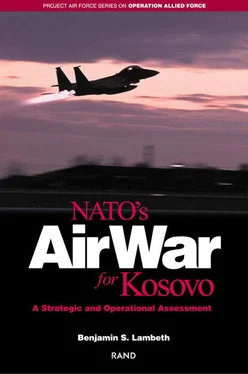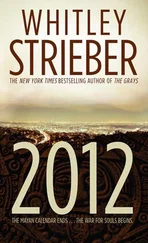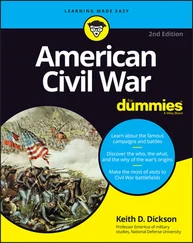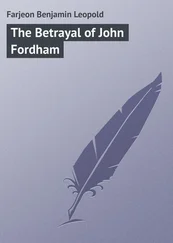As more details about the background and conduct of the Kosovo air war have become available, the debate over Allied Force and over the appropriate “lessons” to be drawn from it has tended to fragment into what one observer called “a series of mini-arguments about details and facts and figures,” perhaps most notoriously with respect to how many enemy tanks were destroyed by allied air attacks and whether U.S. and NATO officials conspired to cover up the surprisingly poor performance of the air effort in that respect. [1]In contrast, this study seeks to maintain a steady lock on the larger picture. Although it freely ventures into operational and technical detail wherever appropriate, including on the tank issue and on related questions concerning how various items of equipment worked, it focuses more on such broader questions as what U.S. and allied air power accomplished by way of achieving their goals and what the operation’s experience revealed about the state of air power’s continuing evolution as an instrument of joint and combined warfare.
Toward that end, the book first describes the air war’s strategic and operational highlights in chronological order. It then considers the various factors that interacted to induce Milosevic to capitulate when he did. After that, it explores air power’s principal accomplishments, as well as the many problems that worked to render Allied Force a less than uniformly satisfactory performance by allied air power. [2]The final chapter reviews Operation Allied Force in political and strategic context and reflects on the most policy-pertinent conclusions to be drawn from the experience. Because of the study’s predominant focus on matters pertaining to planning and execution, it does not consider, other than by way of brief stage-setting, the politics and diplomacy that immediately preceded the air war, let alone the deeper historical roots of the crisis.
Chapter Two
PRELUDE TO COMBAT
Operation Allied Force, largely prompted by humanitarian concerns, was a response by the United States and NATO to the steadily mounting Serb atrocities that were being committed against the ethnic Albanians who made up the vast majority of Kosovo’s population. At bottom, the crisis was rooted in a centuries-long history of Balkan strife. [1]Its more immediate origins could be traced back to a decade before, when the disintegration of the Yugoslav
Federation began during the waning years of the cold war. [2]Under the iron rule of Yugoslavia’s independent communist leader, Marshal Josip Broz Tito, Kosovo had remained an autonomous and self-governing province of Serbia for nearly 40 years, and members of its largely ethnic Albanian populace were able to live a reasonable approximation of normal lives. Once communist rule began to unravel in the late 1980s after Tito’s death, however, the Serb minority in Kosovo reacted forcefully against what they perceived to be willful discrimination against them by the Kosovar Albanian authorities.
After winning an election in 1989 in which he played heavily on Serb feelings of mistreatment, Milosevic decreed an end to Kosovo’s autonomy, imposed Serb rule, and unleashed a resurgence of ethnic violence throughout the former Yugoslav Federation that, by 1995, had caused more than a quarter of a million innocent citizens to lose their lives in a renewed Balkan civil war. That, in turn, gave rise to a group of Kosovar Albanian nationalists who espoused the use of violence in pursuit of Kosovar independence, ultimately spawning a militant émigré group called the Kosovo Liberation Army (KLA, or UCK in Albanian, for Ushtria Clirimtare e Kosoves ), whose members began waging a partisan war against the Serb army and police units that controlled the increasingly conflicted province.
In February 1998, in an escalating wave of reprisals against the rearguard actions of this nascent band of ethnic Albanian guerrillas, a unit of the Yugoslav interior ministry police, or MUP (for Ministerstvo Unuprasnij Poslava ), counterattacked in force against the KLA in the Drenica region of Kosovo, wantonly killing some 80 Kosovar Albanian civilians in the process. In response, U.S. special envoy Richard Holbrooke was sent to Belgrade by the Clinton administration to beseech Milosevic to desist from further acts of violence against Kosovar civilians. Milosevic refused. Later, in early fall of 1998, some 30,000 Kosovar civilians were forced to flee their homes in the wake of resurgent Serb pillaging and terrorizing of the Kosovo countryside. That renewed violence prompted the passage on September 23, 1998, of UN Security Council Resolution 1199 warning of an “impending humanitarian catastrophe” and calling for an immediate halt to the escalating strife in Kosovo. The following month, the Clinton administration again dispatched Holbrooke to Belgrade in a bid to persuade Milosevic to agree to negotiations on Kosovar autonomy and to accept a presence in Kosovo of unarmed international monitors from the Organization for Security and Cooperation in Europe (OSCE) to verify Serb compliance with Resolution 1199.
In the end, Milosevic assented to negotiations and agreed to permit an OSCE verification mission to enter Kosovo after the endorsement by the North Atlantic Council (NAC), the political arm of NATO, of an Activation Order (ACTORD) laying the groundwork for NATO air attacks against Serb military targets as an inducement. The mission, headed by U.S. diplomat William Walker, aimed at ensuring that the KLA’s partisans remained in the mountains and that the Yugoslav army, or VJ (for Vojska Jugoslavskaya ), remained in its garrisons. Air surveillance for this OSCE presence was to be provided by NATO, and a NATO extraction force began forming in Macedonia to withdraw the OSCE observers under armed protection in case events turned sour enough to endanger their safety.
Before long, however, the OSCE monitors found themselves watching helplessly as the Serb killing of Kosovar Albanians continued at a slow but steady rate. In response, NATO declared that it would take “all steps,” including air strikes if necessary, to compel Serb compliance in bringing about a settlement in Kosovo. Meantime, as Holbrooke continued shuttling between Belgrade and Washington, Kosovo remained all but absent from the Clinton administration’s list of priorities. Among other preoccupations closer to home, final preparations for the president’s impeachment trial in the House of Representatives had entered full swing by December 1998, and tensions with Iraq were about to escalate into the launching of Operation Desert Fox that same month, a four-day mini-air operation waged by U.S. and British forces in what turned out to have been an almost entirely symbolic and ineffectual response to Saddam Hussein’s earlier summary decision to refuse further cooperation with UN arms inspectors.
The trigger event that finally spurred the Clinton administration into action with respect to Kosovo occurred on January 15, 1999, when MUP and Serb paramilitary troops in hot pursuit of KLA fighters entered the village of Racak and proceeded to slaughter 45 hapless ethnic Albanian civilians. Ambassador Walker personally traveled to Racak the next day to view the carnage, calling it a crime against humanity and all but blaming Milosevic by name for having ordered it. Two days later, the Yugoslav government, in response, declared Walker persona non grata and issued an expulsion order, which Walker ignored. [3]The Racak massacre signaled the beginning of the end to any further active role for the OSCE monitors, who were now increasingly at physical risk themselves and who were ultimately withdrawn less than a week before the commencement of Operation Allied Force. It turned out to be a serious miscalculation on Belgrade’s part. What Milosevic may have thought was “just another village” proved to be one too many as far as the United States and NATO were concerned. [4]The event marked the beginning of the final countdown toward NATO’s ultimate decision to proceed with Allied Force. On January 30, the NAC approved the launching of NATO air attacks against Serbia if the Serb leaders continued to refuse negotiations with their Kosovar counterparts.
Читать дальше












